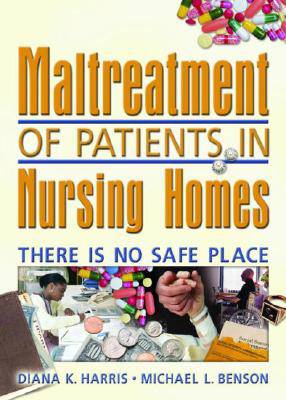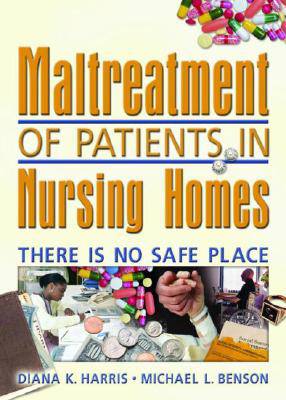
- Retrait gratuit dans votre magasin Club
- 7.000.000 titres dans notre catalogue
- Payer en toute sécurité
- Toujours un magasin près de chez vous
- Retrait gratuit dans votre magasin Club
- 7.000.0000 titres dans notre catalogue
- Payer en toute sécurité
- Toujours un magasin près de chez vous
94,95 €
+ 189 points
Description
Abuse, although often not detected or reported, existed in every facility we surveyed. It is a serious problem.
Old, weak, and often cognitively impaired, nursing home patients can be easy targets for physical, psychological, material, and financial mistreatment at the hands of those entrusted with their care, safety, and well-being. Maltreatment of Patients in Nursing Homes: There Is No Safe Place examines the dark side of nursing homes, where not every employee has the commitment of Mother Theresa. This groundbreaking book applies criminological theory to help develop practical methods of controlling abuse and presents the results of the first and only nationwide study on the theft of patients' belongings, a form of abuse too often ignored by the nursing home industry. Maltreatment of Patients in Nursing Homes surveys employees, administrators, and family members of patients in 47 nursing homes throughout the United States. Their responses provide invaluable insights on a wide range of topics, including the social and psychological factors that cause different types of abuse, characteristics of nursing home patients and employees, the bureaucracy of nursing homes, victimization rates, workforce issues of nursing home aides, and federal regulations for nursing homes. The information gained from the surveys forms the basis for detailed recommendations for creating a safer environment and reducing all forms of abuse, including theft-prevention training programs, background checks and improved screening of potential employees, education and advocacy for current staff, and the reform of federal regulations. Maltreatment of Patients in Nursing Homes examines:- types of physical abuse (restraints, sexual abuse, neglect)
- the who, what, and why of nursing home theft
- types of financial abuse (trust accounts, bank accounts, improper charges for services and drugs, identity theft)
- types of psychological abuse (abandonment, segregation, childlike treatment, verbal abuse)
- effects of psychological abuse (depression, learned helplessness, psychiatric disorders)
- reasons for abuse by employees (staff turnover, job burnout, job dissatisfaction, caregiver stress)
One of the few books to deal with abuse of the elderly outside a domestic setting, Maltreatment of Patients in Nursing Homes: There Is No Safe Place interprets and analyzes abuse to provide new ways of thinking about this growing problem and new methods of preventing it from growing any more widespread.
Spécifications
Parties prenantes
- Auteur(s) :
- Editeur:
Contenu
- Nombre de pages :
- 156
- Langue:
- Anglais
- Collection :
Caractéristiques
- EAN:
- 9780789023261
- Date de parution :
- 08-12-05
- Format:
- Livre broché
- Format numérique:
- Trade paperback (VS)
- Dimensions :
- 228 mm x 211 mm
- Poids :
- 290 g

Les avis
Nous publions uniquement les avis qui respectent les conditions requises. Consultez nos conditions pour les avis.






